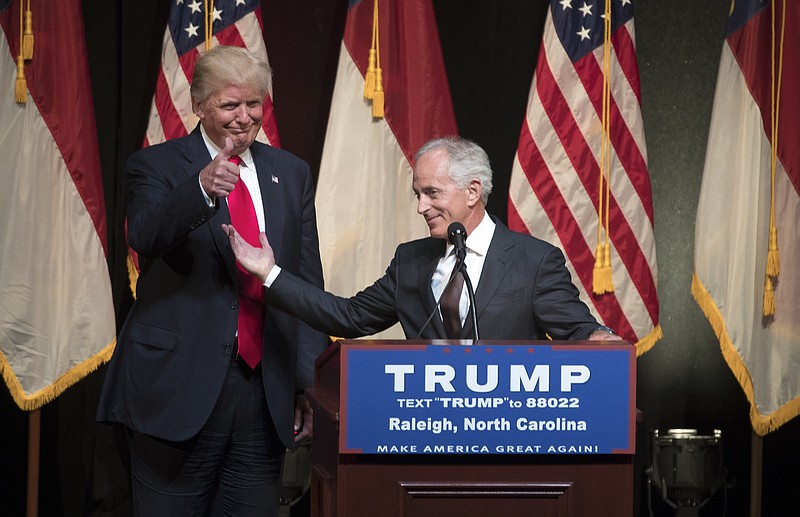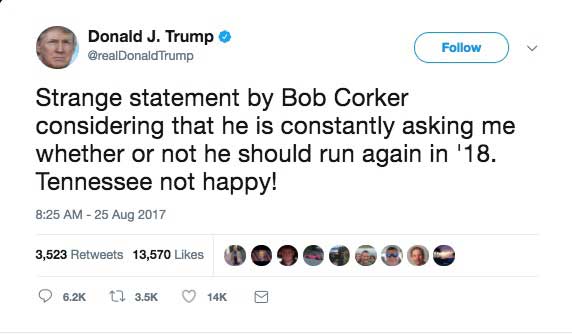Mayweather vs. McGregor it wasn't.
Yet, earlier this month, when President Donald Trump and U.S. Sen. Bob Corker, R-Tenn., traded jabs, there were gasps at ringside.
Jeff Barrett, a Michigan public relations executive and emerging expert on social media, was among those who were surprised the two Republicans faced off.
Barrett, an award-winning blogger who has been named to the Forbes Top 50 list of social media influencers, says Corker should continue to take the high road and not be drawn into a Twitter feud with Trump.
"Corker was asked questions and he answered them honestly," Barrett says. "It wouldn't work to play back to Trump on Twitter."
Hardly a ferocious fight, the mere fact the two Republicans exchanged glancing blows made news.
After a recent speech at the Rotary Club of Chattanooga - as the country was debating the aftermath of the Charlottesville, Va., protests - Sen. Corker said the Trump administration needed to show greater stability and competency.
In turn, President Trump responded with a tweet a few days later suggesting Tennesseans are "unhappy" with Corker. Then on Tuesday, Corker told reporters in Middle Tennessee that he feels he has solid support among Volunteer State voters and intends to remain an independent voice.
For former allies - Corker was considered for a cabinet position by President Trump - the president's Twitter comments were perhaps the beginnings of a crack in the relationship.
Meanwhile, Barrett, the 2015 Shorty Award winner as Best Business Blogger, studies millennials and has more than 300,000 Twitter followers. He is considered an expert in the use of social media as a political and marketing tool. We reached out to him for his take on President Trump's frequent use of Twitter, and the use of social media in politics in general.
Down the road, Barrett says he thinks the political pendulum will swing back to more traditional politicians as presidential candidates. "The smart counter [to Trump] is not Oprah or The Rock or [Facebook co-founder] Mark Zuckerberg," he says.
Meanwhile, social media platforms, such as Twitter, will continue to be a useful megaphone for politicians, he says. A generation ago, Barrett says, network television news and major newspapers controlled information. Now, Americans have so many sources of news and information that politicians are compelled to use social media such as Twitter, Facebook and Instagram to make their cases, he says.
"Simply put, every candidate wants to control their own message," he says.
Still, voters are just learning how to interpret information on social media. For example, much of the political discourse in the 2016 presidential election was steered by bots, web robots used to repeat and amplify (sometimes dubious) information, Barrett says.
View other columns by Mark Kennedy
"I think 2016 was an interesting election," Barrett says. "I don't think people always understood what they were seeing [on social media]."
Just like voters came to question television and newspapers, the so-called legacy media, they will eventually grow more cautious about believing their social media feeds, he says.
"We used to believe that if you sold something on TV it had to be great," Barrett says. Ultimately, viewers realized "if they didn't order in the next 30 minutes, they could still buy [a product] at the same price."
Interestingly, Barrett thinks the growing stereotypes about younger Americans, the so-called millennial generation, are too generalized. For example, he says younger millennials, those under age 25, are trending more conservative than their slightly older cohorts.
Also, Barrett says politics is best understood as a pendulum that swings left and right.
The 2016 presidential election proved, he says, it's hard for a political party to capture a third term in the White House. (It's only been done once since 1950, in 1988 by George H.W. Bush). Meanwhile, he predicts a more mainstream political mood in 2020.
In statistics, they call it reversion to the mean.
And you can put that in your Twitter and tweet it.
Contact Mark Kennedy at mkennedy@timesfreepress.com or 423-757-6645.



